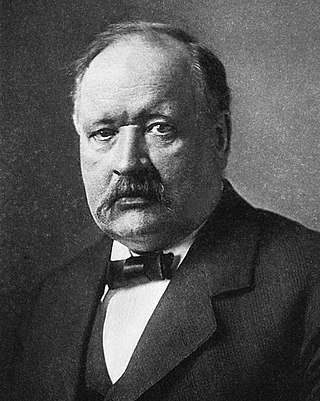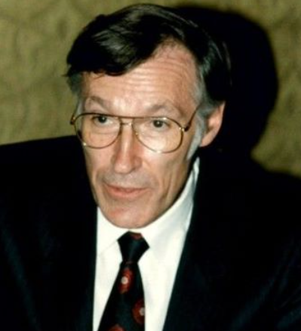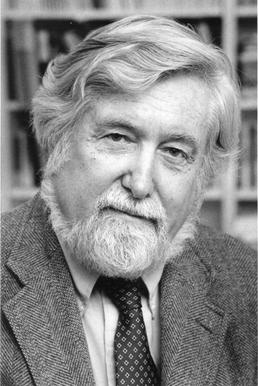Related Research Articles

The University of Gothenburg is a university in Sweden's second largest city, Gothenburg. Founded in 1891, the university is the third-oldest of the current Swedish universities and, with 53,624 students and 6,707 staff members, it is one of the largest universities in the Nordic countries.
Religion is a range of social-cultural systems, including designated behaviors and practices, morals, beliefs, worldviews, texts, sanctified places, prophecies, ethics, or organizations, that generally relate humanity to supernatural, transcendental, and spiritual elements—although there is no scholarly consensus over what precisely constitutes a religion. Different religions may or may not contain various elements ranging from the divine, sacredness, faith, and a supernatural being or beings.

Svante August Arrhenius was a Swedish scientist. Originally a physicist, but often referred to as a chemist, Arrhenius was one of the founders of the science of physical chemistry. He received the Nobel Prize for Chemistry in 1903, becoming the first Swedish Nobel laureate. In 1905, he became the director of the Nobel Institute, where he remained until his death.

Charles Margrave Taylor is a Canadian philosopher from Montreal, Quebec, and professor emeritus at McGill University best known for his contributions to political philosophy, the philosophy of social science, the history of philosophy, and intellectual history. His work has earned him the Kyoto Prize, the Templeton Prize, the Berggruen Prize for Philosophy, and the John W. Kluge Prize.
The Gifford Lectures are an annual series of lectures which were established in 1887 by the will of Adam Gifford, Lord Gifford at the four ancient universities of Scotland: St Andrews, Glasgow, Aberdeen and Edinburgh. Their purpose is to "promote and diffuse the study of natural theology in the widest sense of the term – in other words, the knowledge of God." A Gifford lectures appointment is one of the most prestigious honours in Scottish academia.

Walter Burkert was a German scholar of Greek mythology and cult.

Clifford James Geertz was an American anthropologist who is remembered mostly for his strong support for and influence on the practice of symbolic anthropology and who was considered "for three decades... the single most influential cultural anthropologist in the United States." He served until his death as professor emeritus at the Institute for Advanced Study, Princeton.

David W. Harvey is a British-American academic best known for Marxist analyses that focus on urban geography as well as the economy more broadly. He is Distinguished Professor of anthropology and geography at the Graduate Center of the City University of New York (CUNY). Harvey has authored many books and essays that have been prominent in the development of modern geography as a discipline. He is a proponent of the idea of the right to the city.
Arthur Michael Kleinman is an American psychiatrist, social anthropologist and a professor of medical anthropology, psychiatry and global health and social medicine at Harvard University.
John Elof Boodin was a Swedish-born American philosopher and educator. He was the author of numerous books proposing a systematic interpretation of nature. Boodin's work preserved the tradition of philosophical idealism within the framework of contemporary science. Boodin also focused on the social nature of human behavior believing an understanding required an appreciation of individual participation in social life and interpersonal relationship.

Jan Kenneth Eliasson is a Swedish diplomat who was Deputy Secretary-General of the United Nations from July 2012 to December 2016. A member of the Swedish Social Democratic Party, Eliasson served as Minister for Foreign Affairs from 24 April to 6 October 2006. Eliasson was appointed as Governing Board Chair of the Stockholm International Peace Research Institute in April 2017 and assumed his role as of 1 June 2017.

Olav Kallenberg is a probability theorist known for his work on exchangeable stochastic processes and for his graduate-level textbooks and monographs. Kallenberg is a professor of mathematics at Auburn University in Alabama in the USA.
Stanley Jeyaraja Tambiah was a social anthropologist and Esther and Sidney Rabb Professor (Emeritus) of Anthropology at Harvard University. He specialised in studies of Thailand, Sri Lanka, and Tamils, as well as the anthropology of religion and politics.

Hans Joas is a German sociologist and social theorist.
Saba Mahmood (1961–2018) was professor of anthropology at the University of California, Berkeley. At Berkeley, she was also affiliated with the Center for Middle Eastern Studies, Institute for South Asia Studies, and the Program in Critical Theory. Her scholarly work straddled debates in anthropology and political theory, with a focus on Muslim majority societies of the Middle East and South Asia. Mahmood made major theoretical contributions to rethinking the relationship between ethics and politics, religion and secularism, freedom and submission, and reason and embodiment. Influenced by the work of Talal Asad, she wrote on issues of gender, religious politics, secularism, and Muslim and non-Muslim relations in the Middle East.
Jan Östen Hjärpe is a Swedish Islamicist and a professor emeritus in Islamic studies at the Centre for Theology and Religious Studies at Lund University.
Cecil Helman was a South African doctor, author, and medical anthropologist. He published poetry, essays, and short stories, as well as academic books and papers.

Nils Rosén von Rosenstein was a Swedish physician. He is considered the founder of modern pediatrics, while his work The diseases of children, and their remedies is considered to be "the first modern textbook on the subject".

Werner Günter Adolf Jeanrond was Professor of Systematic Theology with special responsibility for Dogmatics at the University of Oslo. He is retired.

Ferdinando Sardella, born 1960, is a Swedish scholar of the history of religions, Hinduism, and religious studies, the former director and coordinator of the Forum for South Asia Studies at Uppsala University.
References
- 1 2 3 "Professors P - Research, University of Gothenburg, Sweden". Archived from the original on 1 June 2012. Retrieved 14 February 2011.
university lecturer between 2000 and 2004
- ↑ Potier, Beth (2001-11-08). "Religion course touches a nerve". Harvard Gazette. Archived from the original on 28 May 2011. Retrieved 14 February 2011.
- ↑ "Brian Palmer". schema-root.org. Archived from the original on 4 March 2016. Retrieved 14 February 2011.
- ↑ Mathews, Dan (2007). Committed: A Rabble-Rouser's Memoir. New York: Atria Books. p. 200. ISBN 978-0-7432-9187-3.
- ↑ ManssonS, Sandra (2010-05-18). "Brian Palmer Lecture, Civic Courage: Making a Difference and Paying a Price". Democrats Abroad. Archived from the original on 25 July 2011. Retrieved 14 February 2011.
- ↑ Robinowitz, Christina Johansson; Carr, Lisa Werner (2011). Modern-Day Vikings: A Pracical Guide to Interacting with the Swedes. Boston, MA: Hachette Book Group. ISBN 978-0-585-43441-4.
- ↑ Lem, Winnie; Leach, Belinda (2002). Culture, Economy, Power: Anthropology as Critique, Anthropology as Praxis. Albany, NY: SUNY Press. p. 246. ISBN 0-7914-5289-1.